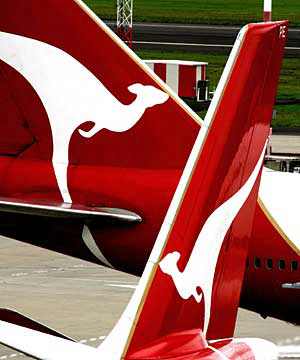After Qantas All The King's
Men . . .
 May
not be able to put air cargo together again. May
not be able to put air cargo together again.
At least that is the view of some air cargo
insiders in Europe.
The recent announcement November 28 that
Australian airline Qantas Airways Limited is making a plea deal with the
United States Department of Justice and paying a U.S. $61 million fine
related to “illegal price fixing conduct within its freight division,”
has lubricated law enforcement for even deeper thrusts amidst more widespread
and further scrutiny and investigations around the world - and some more
sleepless nights and admissions for other cargo executives.
The Qantas Humpty Dumpty effect has already
taken hold.
On Thursday November 29, The Sydney
Morning Herald said the global debacle had “snowballed into
the world’s largest and most far reaching anti-cartel investigation,”
and that “Legal firms in Australia, Europe, North America and even
Tanzania are preparing (more) class actions against the illegally inflated
charges airlines have allegedly been charging importers and exporters
for the past seven years.”
The Melbourne Herald Sun went on
to say that “Qantas is in talks with the Australian Competition
and Consumer Commission which is likely to hand down similar penalties
(to the U.S.),” but went on to say that price fixing is not a criminal
offense in Australia or New Zealand, as it can be in the U.S.
That’s good news for any New Zealanders
that might be involved, as also on Thursday, a story from the New Zealand
Press Association reported that country’s Commerce Commission had
begun its own investigations into “airlines’ conduct,”
but didn’t specify which airlines.
Neither the New Zealand Commerce Commission
nor the Australian Commerce Commission could immediately be reached for
comment. Qantas and Air New Zealand also did not immediately return requests
for comment.
Air New Zealand has already been named in
a class action suit for freight price fixing filed in early 2007 also
involving the likes of Qantas, Lufthansa, Singapore Airlines, and British
Airways, while two years ago, Air New Zealand was convicted of violations
to New Zealand’s Fair Trading Act for deceptive advertising, the
NZPA report said.
The implications are bad not only for the
reputation of airlines and business in general, but also for passengers
and cargo customers that may pay the price of the fines and legal fees
in higher ticket and per kilogram cargo charges. Similarly, investors
could get burned by any financial drains the airlines may incur paying
the price.
“Anybody who thinks that these airline
fines are what this investigation is all about as an end all to further
probes has rocks in their head,” a source told Air Cargo News/FlyingTypers
this week.
“What it is all about is information,”
the source continued. “The problem is once law enforcement and various
politicians get a hold of an issue, all hell breaks loose.
“Just look at the compliance havoc
over politician-mandated U.S.A. cargo security going on around the world
right now.
“These plea deals have turned the
mattress over along with details that will open up even more probes,”
the source said.
(Earlier this year, both British Airways and Korean Airlines agreed to
pay $300 million each in fines related to cargo price fixing, while other
class action suits are pending).
On the other hand, there were some observers
that played down some aspects of the entire fiasco. To be sure, they still
agreed it should be settled as soon as possible.
Per-Ola Hellgren, an analyst at Landesbank
Baden-Wuerttemburg in Mainz, Germany called the grievances toward the
industry “systematic,” adding that airlines that still had
any undiscovered discrepancies in their businesses might want to strike
a deal with authorities voluntarily, as that route could probably be done
more quietly and at lower costs.
“It would be in the best interest
of any other airlines that have skeletons in their closets to come forward
in order for this mess to get cleaned up and so that everyone can get
on with business,” Mr. Hellgren said.
He said he thought any damage to the credibility
of the airlines in the public’s view – if there ever was any
- was probably already done, while on the other hand the entire issue
could also, in some ways, be regarded as a matter of perception:
“This could be seen as a question
of the interpretation of what constitutes admissible behavior,”
he said.
“Airlines may have been surprised
by the resoluteness and vigor of prosecutors – regulators may have
been tighter than airlines expected. At the end of the day, to some extent,
this is arbitrary. It’s essentially someone defining one thing and
someone else defining it differently.
“It would be good for airlines to
get all of this behind them and relegated to the history books,”
Mr. Hellgren said.
George, Geoffrey
|



